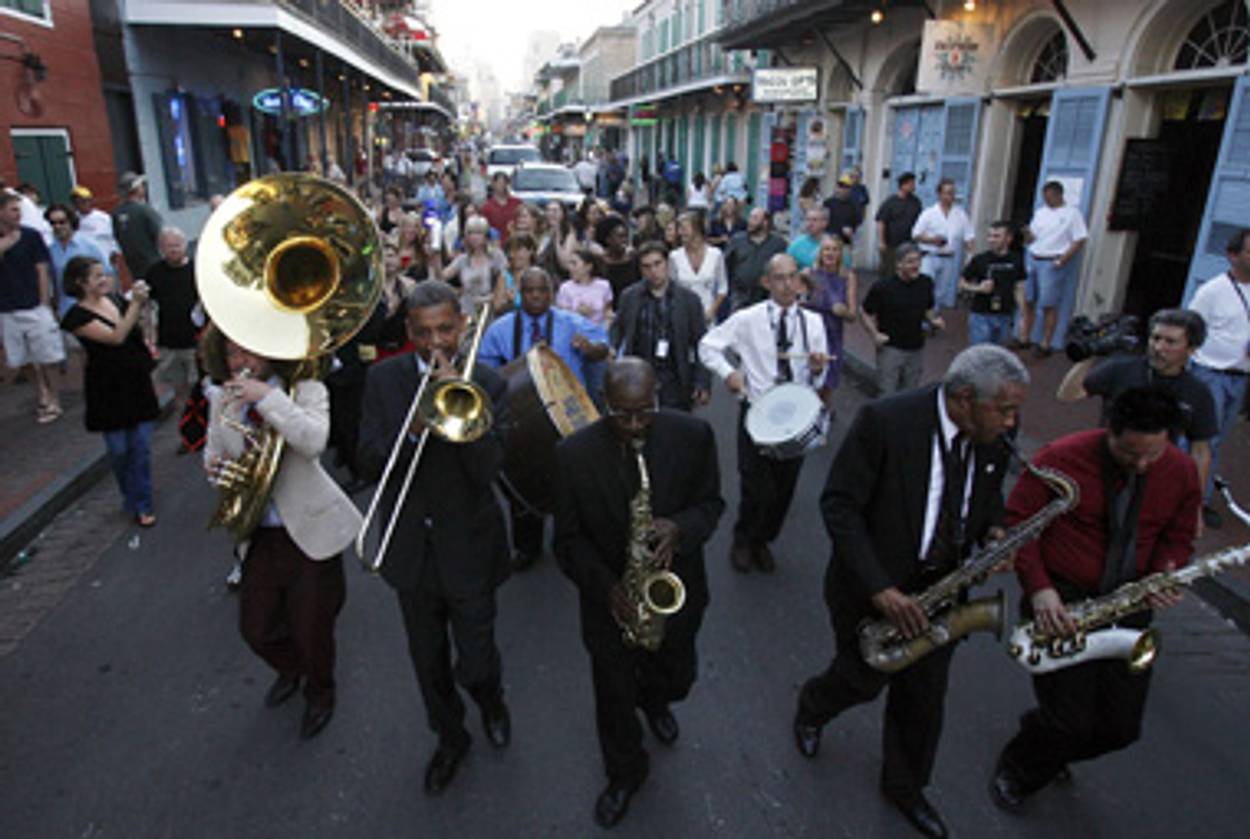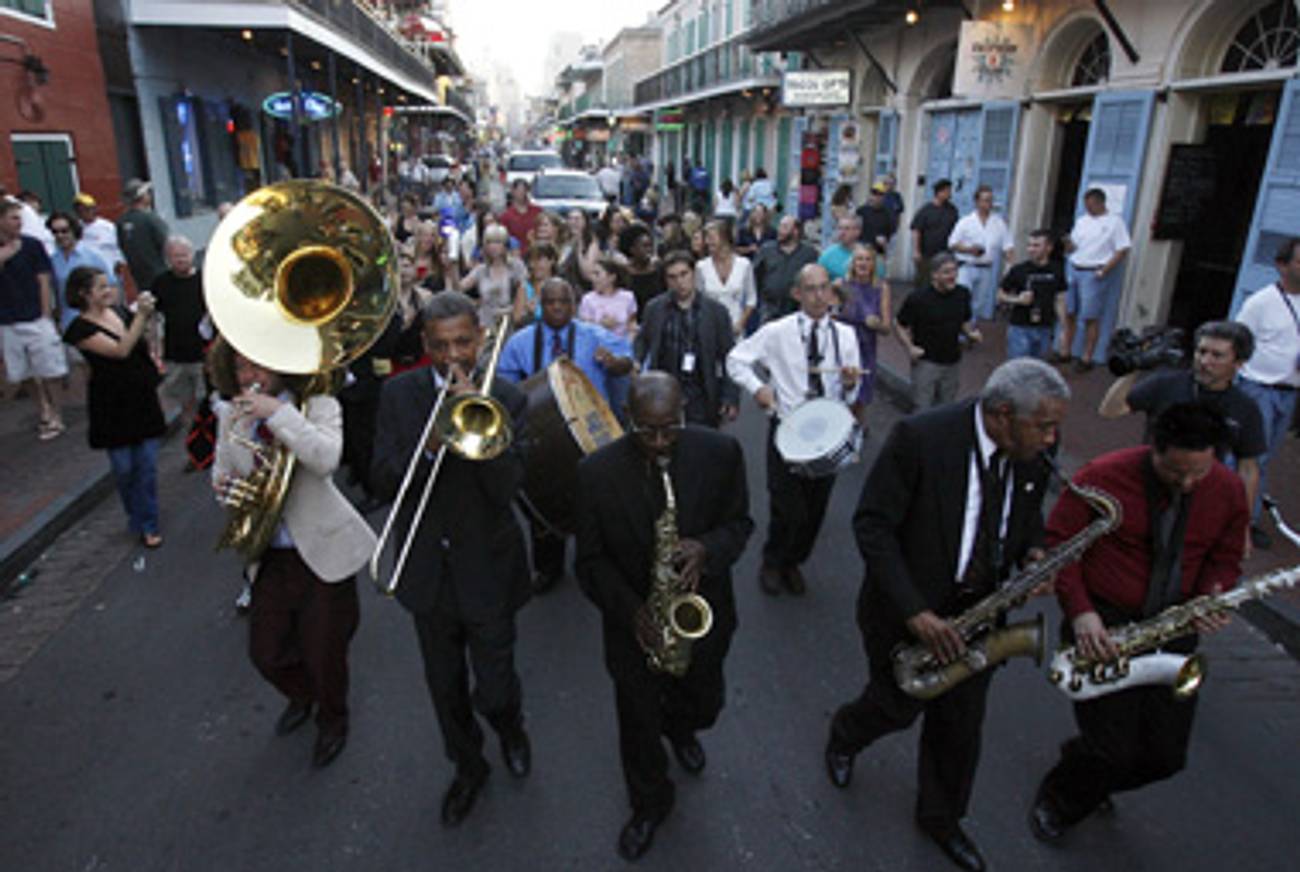Jazz Messengers
A handful of Jewish entrepreneurs are reinventing the jazz scene in New Orleans, a city with a tiny and aging Jewish population but a strong musical tradition in which different cultures have long mixed




Eleven years ago, Howie Kaplan spotted an article in the New Orleans Times-Picayune: The Howlin’ Wolf, a music club in the trendy Warehouse District, was for sale. That was on a Friday. He contacted the club the following Monday, and a 15-minute meeting over coffee turned into a four-hour conversation that concluded with a business deal, making Kaplan the Howlin’ Wolf’s new owner. Today, the club is one of the premier music venues in the city and a mainstay for celebrated local artists like the Hot 8 Brass Band and Dr. John.
It is no secret that the Jewish people figure prominently in the American music industry, but New Orleans is not Los Angeles or New York City. With an aging Jewish population of less than 10,000 in a city of almost 345,000, it’s hard to imagine a serious Jewish influence on a music scene that’s traditionally and predominantly African American. And yet a small group of Jewish entrepreneurs—including Kaplan, record executive Mark Samuels, and musician and promoter Ben Jaffe—are currently at the fore of New Orleans jazz, helping shape the familiar sound and find new audiences for artists both new and established.
Kaplan spent his career working for the Colorado Rockies. Fourteen years ago, after he was passed over for a promotion, he decided to relocate and bought a bar in the New Orleans suburb of Metairie. Three years later, he bought the Howlin’ Wolf. Next, Kaplan recalled, “one of my managers came to me with the idea to manage Rebirth,” one of the most prominent and successful bands in town. “It made sense because we were friends with the band and they appeared to be needing some help. It’s kind of funny that you’ve got a Jewish guy from Illinois with family roots in Brooklyn, and now I manage the premier brass band in New Orleans.” Now he also manages the Revivalists, a indie-rock band, and his team at the Wolf helps produce major annual festivals, including the Essence Music Festival and the Voodoo Music Experience.
Listen to ‘Why Your Feet Hurt’ by Rebirth Brass Band from their CD Rebirth of New Orleans:
Mark Samuels—the founder and president of Basin Street Records, which has signed artists like Kermit Ruffins, Irvin Mayfield, and Jason Marsalis—is responsible for much of the music on the HBO show Treme. Samuels was an energy executive when he started a record label as a hobby. Early success, however, convinced him to quit his day job, and he produced a string of hits, including a live recording by Kermit Ruffins and the Barbecue Swingers recorded at Tipitina’s, a popular New Orleans club, and a record by Los Hombres Calientes, that won Latin Billboard’s award for top jazz album of the year.
A New Orleans native, Samuels developed his passion for local music in his teens, he said: “It was a combination of going to junior and senor proms and going to BBYO dances”—B’nai Brith youth group dances. “That’s when I first saw Deacon John and the Ivories. High school is also when I first went to Tipitina’s and saw the Neville brothers,” he said. But there was something else: “I was fortunate enough to be in the high school band with Wynton Marsalis,” he said. “That allowed me to maintain contact with the things that Wynton was doing during his early recording stages. I eventually met a lot of people in the music industry through him, like Harry Connick Jr. and Jeremy Davenport. He was just that central character that seemed to be in the middle of a lot of the opportunities I had to meet talented artists.”
Listen to ‘Almost Never’ by Jeremy Davenport from his CD We’ll Dance ‘Til Dawn:
Through his involvement in Treme, he’s been able to return the favor, bringing attention to New Orleans artists. “Kermit Ruffins, Jon Cleary, Henry Butler, and Rebirth have all performed on the show, and they’ve all had speaking lines,” Samuels said. “Last summer I had an opportunity to serve on jury duty with Lolis Elie, one of the writers, so I was also pitching story ideas to him.”
“Those guys really got it right,” Kaplan said of Treme’s creators. “They’re as close to the music and culture as anyone’s ever gotten. We are all New Orleanians, that’s who we are first. People talk about whether you’re American first or Jewish first, but here everyone has a shared experience that came from Hurricane Katrina.” The Wolf has been seen on the show, and Kaplan is involved in the production of “A Night in Treme,” a national tour featuring live performances by New Orleans artists.
Listen to ‘Panama’ by Kermit Ruffins from his CD Happy Talk:
Ben Jaffe makes sure there’s always a place for New Orleans jazz in New Orleans. His parents, Allan and Sandra Jaffe, founded Preservation Hall in 1961, a music venue in the French Quarter created to preserve and protect local jazz. When he was in elementary school, Jaffe began studying the string bass with jazz bassist and sousaphonist Walter Payton, who taught band. Payton’s son, the celebrated trumpeter Nicholas Payton, would eventually play with Jaffe in the All Star Brass Band. Now, in addition to helping run Preservation Hall, Jaffe plays tuba for the acclaimed Preservation Hall Jazz Band—which has collaborated with the rockers of My Morning Jacket, played at the Bonnaroo music festival, and recently appeared on Late Show With David Letterman—and also serves as its creative director.
“Growing up, I was exposed to tuba just about every day of my life at Preservation Hall, in parades and jazz funerals,” he said. “We lived up in the French Quarter, so you could literally hear live music from the moment you left your house in the morning until you came home at night.”
Jaffe sees real connections between the Jewish and black communities in the New Orleans music scene. “I think it’s a real testament to the local music scene that there are people with deep roots in the Jewish community, but most of my Jewish connection is to the African American community,” he said. “Walter Payton converted to Judaism later in life. There’s a unique connection between the Jewish and black communities in New Orleans, it’s something that’s really strong.”
Allison Good is a freelance journalist living in New Orleans.
Allison Good is a freelance journalist living in New Orleans.